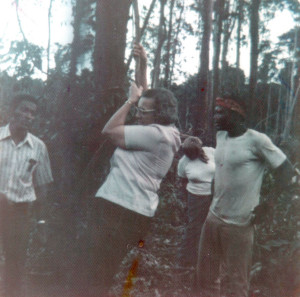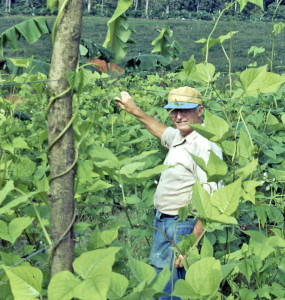
Photo Courtesy of California Historical Society
Eva and Jim Pugh were both kind, industrious, no-nonsense folk who respected hard work and taught others by their example. They both migrated with the Temple from Indiana to California in the mid-1960s. Eva ran a residential care facility in their home. Jim worked full-time, shift work, at the Masonite plant in Ukiah.

Photo Courtesy of California Historical Society
But Eva’s biggest responsibility was handling the Temple’s finances. She set up the many accounts the Temple had and deposited money into them. She also monitored the Temple’s tithing and contribution records. A visitor to the Pugh household – when invited – on any late evening would likely see the dining room table covered with ledgers, coins, money pouches, etc. As the Temple expanded and shifted to San Francisco, accounting became more than one person could handle. Although church finances became managed in San Francisco, Eva always remained a key financial figure.
In Redwood Valley, Eva also ran the Temple kitchen, cooking meals for services. The kitchen was small for the amount of food served and running it took a number of people working together. Helen Swinney and Rheaviana Beam were usually there too, as well as Sylvia Grubbs, Rosie Ijames, Wanda Kice, Clara Phillips, or Edie Kutulas. Eva always seemed to arrive first, setting up for the day or evening. On weekends, everyone brought food, like a potluck, which was served buffet-style from the counter.
It was Eva who prepared pots of chili for Wednesday night meeting, and as more San Francisco people began attending on Wednesdays, she used bigger pots. The chili was mild with many pounds of ground beef, many number-ten cans of chili beans, tomatoes and tomato sauce. Eva told me once that her secret ingredient was spaghetti – “spaghettuh” as she called it – broken and stirred in as it simmered.
The kitchen had to make sure food was prepared and ready on time – which might be sooner or later, depending on what else was going on. Meals might be after service. When time was short, plates or bowls of food were passed down the rows, and people ate as the meeting continued. Whatever was practical… It all just sort of happened with little apparent direction, as everyone just pitched in – though still under Eva’s firm hand.
When the service and the meal were over, a church crew would put up chairs and tables on racks and mopped the floors. If he wasn’t working a shift at Masonite, Jim Pugh was usually one who mopped after services. Others pitched in as well, but I remember him as he actually taught me how to mop. The first time I came to a Redwood Valley service, I helped mop after services. The mops were the type with large yarn heads, heavy when wet. When pushing my mop to and fro didn’t do much, Jim Pugh laughed and showed me how to swing it back and forth, letting the mop’s weight move it and clean the floor in the process. Mopping became much easier and was actually kind of fun.
Jim was a quiet man, with much energy for whatever he did. Like most in the Temple community, he was always there when needed. The photos of him in Jonestown usually find him among the rows of plants, maintaining the garden.
What impressed me then and always about Peoples Temple was that it was a community whose wisdom came from practical experience, common sense and commitment to work together. Eva and Jim Pugh exemplified this: they knew far more than I had ever learned in college, and helped me learn more about people than I had ever known before.
(Don Beck was a member of Peoples Temple for ten years. He directed the Peoples Temple children’s choir during its Redwood Valley years and made several trips to Guyana during its pioneer days. Beginning about 20 years after the tragedy, shortly after this site went online, he became one of its most dedicated researchers, transcribing Edith Roller journals, reviewing and analyzing Jonestown records released through the Freedom of Information Act, and compiling them for the first section of documents on the Jonestown Research page. He also contributed numerous articles and remembrances. Most of those writings may be found here.)
(Don died on July 9, 2021, following a lengthy illness. He was 78.)